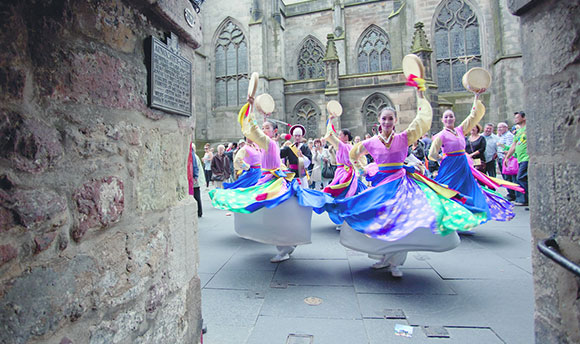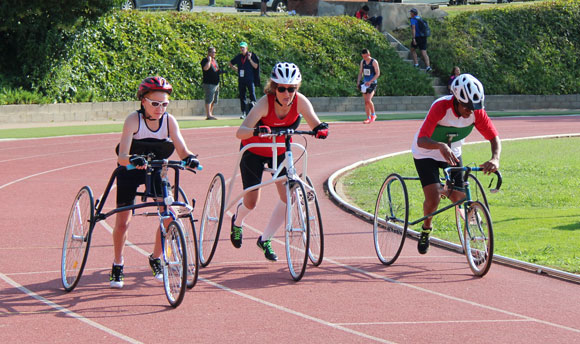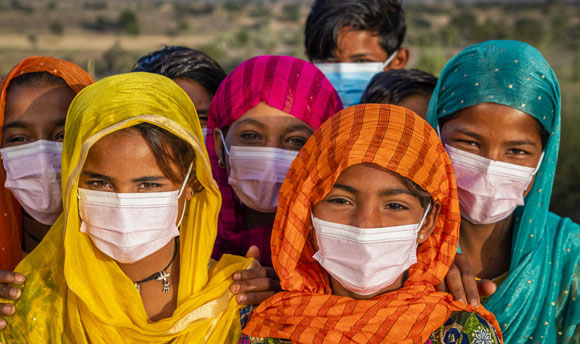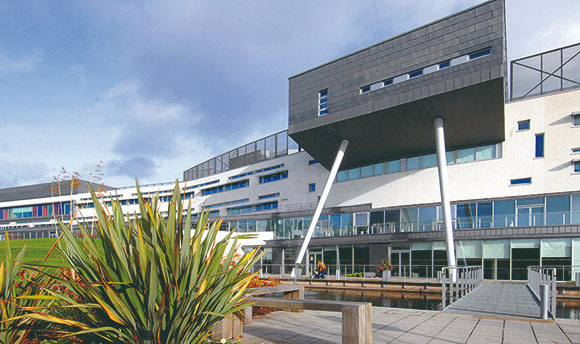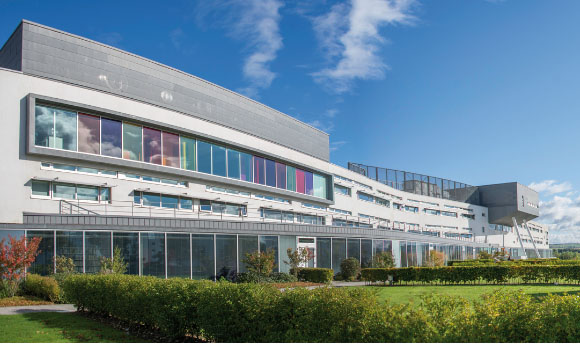Annual Report for the Concordat to Support the Career Development of Researchers 2025
| Name of Institution | Queen Margaret University, Edinburgh |
| Reporting period | November 2024-November 2025 |
| Date approved by governing body |
Approved by the University Court on 22 October 2025 |
| Date published online | 23 October 2025 |
| Web address of annual report | https://www.qmu.ac.uk/research-and-knowledge-exchange/research-and-knowledge-exchange-ke-culture/concordats-and-sector-good-practice/researcher-development-concordat-rdc/concordat-to-support-the-career-development-of-researchers/annual-report-on-compliance-to-court-2025 |
| Web address of institutional Researcher Development Concordat webpage | https://www.qmu.ac.uk/research-and-knowledge-exchange/strategy-and-culture/concordats-and-sector-good-practice/concordat-to-support-the-career-development-of-researchers/ |
| Contact for questions/concerns on researcher career development | Name: Kim Stuart, Director of Research and Innovation, Research and Knowledge Exchange Development Unit (RKEDU) |
|
Date statement sent to Researcher Development Concordat secretariat via CDRsecretariat@universitiesuk.ac.uk |
27 October 2025 |
Statement on how the organisation creates, maintains and embeds a research culture that upholds a positive and inclusive environment for researchers at all stages of their careers.
Queen Margaret University’s (QMU) commitment to positive, inclusive, and supportive research culture is embedded in our Research and Knowledge Exchange (KE) Strategy 2022–2027 and KE and Innovation Fund (KEIF) Strategy 2025-30 which places people, culture, and impact at its core. Our vision is to be a leading, inclusive modern university, known for transformative research and KE, with a culture that is progressive, distinctive, and far-reaching in its impact.
Strategic Framework and Governance
QMU’s research culture is underpinned by sector-wide frameworks, including the Concordat to Support the Career Development of Researchers (RDC), the Concordat to Support Research Integrity, the Knowledge Exchange Concordat, the Concordat for the Environmental Sustainability of Research and Innovation Practice, and the Technician Commitment. Our Research Culture Group (RCG) leads on the implementation of these commitments, ensuring that our policies and practices are aligned with national and international standards. The RCG works closely with QMU Schools, strategic Research and KE Centres (RKECs), and Professional Services to champion equality, diversity, and inclusion (EDI) and to promote a healthy, open, and collaborative research environment.
Positive and Inclusive Environment
QMU has implemented robust policies and processes to support researchers, including the Dignity at Work and Study Policy, revised in 2024 to provide clear guidance and support for all staff. Wellbeing is prioritised through initiatives such as the Employee Assistance Programme and vibrant Diversity, Inclusion and Wellbeing Calendar. Annual internal staff survey and biennial participation in CEDARS inform ongoing improvements, with over half of staff (59% in 2024 – an improvement from 44.8% in 2023) reporting that QMU supports their mental health and wellbeing.
Integrity, Ethics, and Responsible Research and Innovation
Research integrity is embedded through access to internal ethics training, UKRIO online Introduction to Research Integrity training and active participation in national networks such as UKRIO and SRIN. QMU’s ethics governance includes both Divisional and University-level committees, ensuring rigorous ethical review and alignment with national safeguarding standards. As a signatory to DORA and the Leiden Manifesto, QMU promotes responsible use of research metrics and transparent assessment practices.
Support for Researchers at All Stages
QMU facilitates tailored support for researchers at every career stage, from doctoral candidates to senior academics. This includes mentoring schemes, and professional development programmes, with ongoing work towards enhanced career pathways. Early Career Researchers (ECRs) and Contract Research Staff (CRS) benefit from dedicated networks, training, and opportunities for leadership and collaboration. The annual Researcher Development Training Programme and QMU’s active participation in initiatives such as the Scottish Research Integrity and Culture Week ensure ongoing skills development and community building.
Continuous Improvement and Inclusivity
QMU’s research culture is continuously evaluated and enhanced through regular review of policies, action plans, and KPIs. Feedback from staff, benchmarking against national data, and engagement with sector-wide initiatives drive ongoing progress. The university is committed to reducing precarity, promoting equality, diversity and inclusion (EDI), supporting career progression, and ensuring that all those involved in research - regardless of role, contract type or career stage - are valued and empowered to thrive.
Provide a short summary of the institution’s strategic objectives and implementation plans for delivering each of the three pillars of the Concordat (environment and culture, employment, and professional development of researchers) for your key stakeholder groups together with your measures for evaluating progress and success.
Environment and Culture
QMU is committed to cultivating a research and KE environment that is inclusive, supportive, and aligned with sector-wide standards. This commitment is anchored in the integration of the Concordat to Support the Career Development of Researchers and the Concordat to Support Research Integrity into institutional strategy. A key driver of this work is the Research & KE Culture KPI framework, developed using insights from the CEDARS survey, which enables benchmarking and continuous improvement across Schools and RKECs.
Safeguarding and research integrity training are embedded within the Researcher Development Training Programme, ensuring that all researchers are equipped to uphold responsible research practices. Institutional policies on Research Data Management (RDM) are under review to ensure alignment with national standards and funder expectations. Research managers play a central role in implementing KPIs, promoting wellbeing initiatives, and overseeing shared research infrastructure. Researchers are encouraged to engage with training, contribute to feedback mechanisms such as CEDARS, and make use of resources that support wellbeing and integrity.
Progress is monitored through KPI adoption rates, improvements in CEDARS and internal indicators, and participation in safeguarding and integrity training - ensuring transparency and accountability in delivering a healthy research culture.
Employment
QMU is dedicated to embedding EDI across all aspects of researcher employment. The institution recognises the importance of fair and transparent recruitment, promotion, and career progression, and is committed to addressing precarity in research careers. Regular HR policy reviews strive to ensure that CRS have equitable access to enhanced terms, career pathways, and professional development opportunities.
Institutional actions include integrating EDI principles into recruitment and promotion processes, improving support for researchers returning from periods of absence, and ensuring continuity of access to systems and resources for CRS post-contract. Research managers are responsible for promoting the Dignity at Work and Study policy, raising awareness of available support, and encouraging staff engagement in policy development and feedback. Researchers are expected to participate in training, engage with institutional policy development, and access support for career transitions and progression.
Evaluation of progress includes staff surveys measuring awareness and satisfaction, diversity and equity indicators in recruitment and promotion, CRS involvement in policy reviews, and annual reporting on bullying, harassment, and misconduct. These measures support QMU in efforts to maintain a fair, inclusive, and sustainable employment environment for researchers at all career stages.
Professional Development of Researchers
QMU is committed to providing visible, accessible, and impactful professional development opportunities that support researchers throughout their careers. Recognising the importance of researcher identity, career progression, and external engagement, the university has embedded development policies into institutional practice and plans are under way to advance career pathways focused on KE and impact.
Institutional efforts include monitoring data on researcher career destinations, novel approaches to support researchers traverses academic, policy and innovation career pathways, enhancing systems that support researcher identity and visibility, and promoting mentoring and training programmes tailored to doctoral, early career, and mid-to-late career researchers. Research managers play a key role in encouraging participation in professional development opportunities, supporting staff in developing research profiles, and facilitating effective development conversations through annual Performance Enhancement Reviews. Researchers are encouraged to engage with mentoring schemes, maintain up-to-date profiles, and contribute to career tracking and feedback processes.
Progress is assessed through participation rates in development and mentoring programmes, awareness and uptake of career pathways, and feedback from training activities. These efforts ensure that researchers at QMU are supported to thrive, develop professionally, and contribute meaningfully to the wider research and KE community.
Please provide a brief statement describing your institution’s approval process of this report prior to sign off by the governing body
This report was developed with input from and based on activities arising from the work of our Research Culture Group (RCG). The report is subject to approval by QMU RSC and Senate prior to submission to University Court.
Concordat Pillar: Environment and Culture
Summary of actions taken, and evaluation of progress made, in the current reporting period to implement your plan to support the three pillars in respect of each of your key stakeholder groups Institution; Academic Managers of Researchers
Institution
In AY 2024–25, QMU strengthened its commitment to a positive, inclusive, and responsible research and KE culture. This was achieved through the integration of the Concordat to Support the Career Development of Researchers and the Concordat to Support Research Integrity into institutional governance. Key developments included the establishment of the Research and KE Governance Steering Group and the creation of a Research & KE Culture KPI framework, informed by CEDARS survey data and internal consultation. This framework supports strategic planning, benchmarking, and continuous improvement across Schools and RKECs.
QMU re-joined the UKRIO membership, enhancing staff access to sector-leading guidance and training. The university also co-led the cross-institutional Research Integrity and Culture Week 2025, in collaboration with Heriot-Watt University, the University of Dundee, and the University of Strathclyde. The week-long programme, aligned with the Vitae Research Culture Framework, promoted best practice in integrity, collaboration, and researcher support.
Safeguarding practices were strengthened through the update and approval of the Safeguarding in Research and KE Guidance, aligned with the QMU Whistleblowing Policy and reporting mechanisms. Safeguarding training was delivered and scheduled for integration into the Researcher Development Training Programme. Ethics governance was enhanced via a new online application system for Divisional and University Research Ethics Committees, improving transparency and efficiency.
To improve access to research support, QMU redesigned its Research and KE webpages and launched a new RKEDU SharePoint site, hosting key policies, training resources, and guidance. The university also initiated collaborative engagement with Heriot-Watt University and East Lothian regional partners to explore joint pathways to research and innovation impact, supporting place-based research culture development.
Academic Managers of Researchers
Academic managers, including Deans, Heads of Divisions (HoDs), and RKEC Directors, played a central role in embedding a healthy and inclusive research culture locally. School Leads for Research Culture and Researcher Development were appointed to support the implementation of Concordat commitments and promote positive practices within their areas.
Managers facilitated staff participation in the CEDARS 2024 Research Culture Landscape pilot, which saw a 48% increase in engagement compared to the previous year. They supported the rollout of wellbeing initiatives, including the Stress Management for Managers programme, and promoted access to the Employee Assistance Programme and other wellbeing resources.
Academic managers contributed to the development of shared research infrastructure, including the institutional research website and digital resource hubs. They supported the integration of safeguarding and integrity training into local induction and development programmes and ensured alignment with national standards and sector concordats.
Researchers
Researchers actively contributed to the development of a positive research culture through engagement with training, feedback, and community-building initiatives. This included participation in safeguarding and research integrity training, supported by QMU’s renewed UKRIO membership and expanded access to online resources. Researchers also took part in the CEDARS survey, providing valuable insights into institutional strengths and areas for improvement.
Wellbeing remained a priority, with researchers encouraged to access support through the Employee Assistance Programme, Mental Health First Aider network, and stress management resources. Their feedback informed updates to ethics and safeguarding policies, ensuring that institutional guidance remained responsive to lived experiences and evolving needs.
Community engagement was strengthened through participation in internal Researcher Connection events and the cross-institutional Research Integrity and Culture Week. These initiatives offered opportunities for networking, peer support, and shared learning, helping to build a more connected and collaborative research environment.
Researchers also engaged with the newly launched RKEDU SharePoint and updated institutional webpages, accessing resources to support responsible research practices, ethics compliance, and wellbeing. Their active involvement was essential to the implementation of the Concordat action plan in AY 2024–25.
Concordat Pillar: Employment
Institution
QMU continued to embed EDI principles across its employment practices, with a focus on supporting researchers at all career stages. A key achievement was the revision and relaunch of the Dignity at Work and Study Policy, which was promoted through awareness sessions and integrated into institutional guidance. This policy provides definitions of bullying, harassment, and discrimination, alongside mechanisms for reporting and accessing support.
QMU also improved researcher induction processes, including tailored support for those returning from periods of absence such as parental leave or secondments. These enhancements were supported by updated guidance and template support plans. In parallel, the university strengthened post-contract continuity for CRS, ensuring access to key systems and resources beyond the end of employment, thereby reducing disruption and supporting ongoing engagement.
The institution engaged in sector-wide discussions on precarity in research careers. A new Career Pathways framework was developed and launched for consultation, aiming to clarify progression routes for academic and research staff. Concerns were raised regarding its alignment with research-only roles, prompting further internal review and dialogue with stakeholders to ensure the framework reflects the diversity of research careers at QMU. This consultation is ongoing.
These actions were supported by the development of the Research & KE Culture KPI framework, which includes indicators related to employment equity, job security, and staff satisfaction. This framework will enable QMU to monitor progress and ensure transparency in delivering its commitments under the Concordat to Support the Career Development of Researchers.
Academic Managers of Researchers
Academic managers contribute to the implementation of employment-related policies and to promoting a fair and inclusive working environment. They supported the rollout of the revised Dignity at Work and Study Policy, ensuring staff awareness and encouraging engagement with associated training and resources.
Managers facilitated CRS participation in HR policy reviews and consultations, including the Career Pathways framework. Their feedback highlighted the need for clearer and more equitable progression routes for research-only staff, and they advocated for alignment with sector standards and institutional commitments to the Concordat.
Support for staff returning from absence was strengthened through improved induction processes and the use of structured support plans. Academic managers also promoted access to wellbeing resources, including the Employee Assistance Programme and mental health support services, and encouraged participation in Inclusive Language sessions and other EDI-related training.
Through their leadership, academic managers helped ensure that institutional policies were implemented effectively at the local level and that researchers were supported in navigating employment-related transitions and challenges.
Researchers
Researchers actively engaged with employment-related initiatives throughout AY 2024–25. Participation in Dignity at Work and Study Policy and Inclusive Language training sessions helped raise awareness of institutional values and support mechanisms. CRS contributed to HR consultations, including feedback on the Career Pathways framework, advocating for clearer recognition of research roles and career trajectories.
Researchers returning from absence benefited from improved induction and reintegration support, including access to updated guidance and tailored support plans. These measures helped ensure continuity and wellbeing during transitions, and reinforced QMU’s commitment to inclusive employment practices.
CEDARS 2024 data provided valuable insights into researchers’ perceptions of institutional support. While many staff expressed confidence in QMU’s commitment to EDI, more modest levels of trust were reported in relation to the handling of misconduct and discrimination. These findings informed the development of targeted indicators within the Research & KE Culture KPI framework, enabling ongoing monitoring and improvement.
Concordat Pillar: Professional Development
Institution
QMU expanded its professional development offer for researchers, reinforcing its commitment to supporting career progression, researcher identity, and external engagement. The annual Researcher Development Training Programme was enhanced to include sessions on narrative CVs, responsible metrics, KE, and impact, aligning with sector concordats and national frameworks.
Professional development policies were promoted through updated induction materials, including the “Welcome to Research and KE @QMU” booklet and RKEDU SharePoint resources. These materials provided clear guidance on institutional expectations, available support, and opportunities for learning and development. Professional development entitlements were highlighted to ensure visibility and uptake across all research-active staff.
QMU began gathering data on researcher career destinations, with mechanisms explored to track outcomes for both doctoral graduates and CRS leavers. This supported strategic planning for future researcher support. Systems to enhance researcher identity and visibility were also strengthened, with guidance on external profiles and routes to independence embedded in REF 2029 planning and RKEC membership criteria.
Mentoring was a key focus, with an interim scheme piloted for CRS and plans to expand provision across Schools. Sector networks such as the British Academy ECR Network and the Cross-Institution Mentoring Scheme (CIMS) were actively promoted, offering QMU research community members access to external mentoring and collaborative development opportunities.
Academic Managers of Researchers
Academic managers played a central role in facilitating professional development at QMU. They supported staff participation in mentoring schemes, promoted engagement with the Researcher Development Training Programme, and encouraged uptake of KE and impact-focused development opportunities.
Managers contributed to the rollout of development conversations training, including “Coaching Conversations” and “Managing Difficult Conversations” workshops. These sessions aimed to enhance the quality of Performance Enhancement Reviews (PER) and equip managers with tools to support researcher growth effectively.
Integration of professional development into workload models and PER processes was actively supported by academic managers. They continued to ensure that researchers were aware of their entitlement to 10 days of professional development annually and encouraged reflection on development needs during review cycles. Managers also facilitated access to external networks and collaborative initiatives, including THRIVE, SHIFT, and the Universities Scotland Research Culture Group.
Support for researcher identity development was another priority. Managers promoted the use of narrative CVs and responsible metrics, aligning with institutional commitments to DORA and the Leiden Manifesto. They also supported staff in updating research profiles and engaging with REF 2029 planning, ensuring visibility and recognition of researcher contributions.
Researchers
Researchers at QMU actively engaged with a wide range of professional development opportunities throughout AY 2024–25, including sessions on narrative CVs, KE, impact, and responsible metrics. These opportunities supported career progression and alignment with sector expectations.
CRS participated in the interim mentoring scheme and attended Researcher Connection events, which provided peer support, networking, and informal development opportunities. Researchers also accessed external mentoring through sector networks such as the British Academy ECR Network and CIMS, enhancing cross-institutional collaboration and learning.
Engagement with identity and profile development was evident, with researchers updating external profiles, contributing to REF planning, and participating in training on routes to independence. Feedback from researchers helped shape the development of future training programmes and mentoring provision. Their active involvement in development conversations, mentoring, and sector networks was essential to the implementation of the Concordat action plan and the creation of a supportive, inclusive, and forward-looking research environment at QMU.
Signature by Pamela Woodburn, Chair, University Court.
Contact for queries: KStuart@qmu.ac.uk
This annual report will be analysed by Universities UK, secretariat for the Concordat to Support the Career Development of Researchers, to identify good practices, themes for development and information to improve national research culture policy and practice.
If you have any questions, or suggestions on how the reporting process could be improved, please contact the secretariat at CDRsecretariat@universitiesuk.ac.uk

